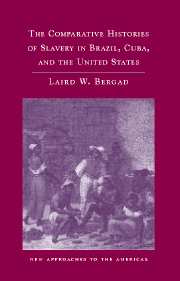Book contents
- Frontmatter
- Contents
- List of Maps and Figures
- Introduction
- 1 From Colonization to Abolition: Patterns of Historical Development in Brazil, Cuba, and the United States
- 2 The Diversity of Slavery in the Americas to 1790
- 3 Slaves in Their Own Words
- 4 Slave Populations
- 5 Economic Aspects
- 6 Making Space
- 7 Resistance and Rebellions
- 8 Abolition
- Bibliography
- Index
- Plate section
3 - Slaves in Their Own Words
Published online by Cambridge University Press: 05 June 2012
- Frontmatter
- Contents
- List of Maps and Figures
- Introduction
- 1 From Colonization to Abolition: Patterns of Historical Development in Brazil, Cuba, and the United States
- 2 The Diversity of Slavery in the Americas to 1790
- 3 Slaves in Their Own Words
- 4 Slave Populations
- 5 Economic Aspects
- 6 Making Space
- 7 Resistance and Rebellions
- 8 Abolition
- Bibliography
- Index
- Plate section
Summary
None but those who resided in the South during the time of slavery can realize the terrible punishments that were visited upon the slaves.
New World slavery has been observed and analyzed from a variety of perspectives in thousands of published volumes in numerous languages. These date from Columbus's voyages of the 1490s, which opened the Americas to European colonization and initiated the transatlantic African slave trade. Yet, despite sympathy or disdain, intimate contact or distance in space and time, and regardless of academic discipline or methodological approach, few observers, present or past, have been able to answer the fundamental, and clearly horrific, question of what it was like to live one's life as a slave. This is a daunting task, and it would hardly be daring to suggest that no one except a slave, of any race or sex regardless of sensitivity or empathy, could possibly answer this query. Only slaves themselves had the ability to convey an accurate portrayal of their sufferings, pains, degradations, struggles, hopes, aspirations, joys, and sorrows. Through their written records, we now will “listen” to slaves speak about various aspects of their experience. These testimonies will provide the most valuable insights into their lives, for the following chapters of this book will use historical sources produced by others to map out various parameters governing slave life. Yet we must keep in mind the points made in the previous chapter.
- Type
- Chapter
- Information
- Publisher: Cambridge University PressPrint publication year: 2007

